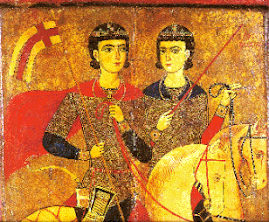@copyright2000 by
Reverend Robert J. Buchanan
Durham, NC 27713 (919) 875-5250
minister at Grace Community
http://hometown.aol.com/GraceEACA/chapter2.html
Homosexuality in Ancient Greece
" Greek culture is often promoted as the most accepting of homosexuality. To some extent, this may be true. The Greeks developed a hedonistic attitude toward the human body and sexuality. Although we may think of hedonism as lustful today, Greek philosophers wrote of hedonism in much more glowing terms. They believed that the naked human body, both male and female, was worthy of respect and admiration. They took great pride in the physical form. Public nudity was both tolerated and often encouraged.
The art and statuary of the ancient Greeks reflects this love for the body, particularly the male body. A major negative of this attitude is that those who were handicapped or unattractive children were often left to die, killed, or used in sacrifice to a god. It was not unusual for men to comment on the attractiveness of other men, or for them to express affection for one another. At least part of the reason for this fascination with physical attractiveness and sex is that the Greeks had developed into a culture that had a great deal of leisure time. They were not required to work constantly in order to survive. Blumenfeld and Raymond wrote: “Similarly, the Greek attitude toward sex was, for the most part, value-neutral. …And, though exclusive homosexuality was probably discouraged as a threat to the family, it was widely tolerated both for older men who had children and for younger men prior to marriage.” (Blumenfeld and Raymond 1988, 155)
The Greek military attitude toward homosexuality was that it brought a sense of comradeship. It was often believed that a person would fight harder to protect his unit if that unit included a lover or lovers. This unique form of male bonding is attributed by some to the greatness of the Greek military might. In spite of this encouragement of homosexual practices, the picture is different for those who were exclusively passive at anal sex. They were believed to be polluted, and to have become like women. Therefore, they were expelled from military service as untrustworthy.
The issue of being exclusively homosexual was extremely difficult. Although the Greeks recognized passion and erotic attraction to both and either sex, they were not tolerant of those who were not also attracted to women. This could very well be due to the recognition that society must be able to reproduce in order to survive. The union of a man and a woman is required to reproduce. “After the age of nineteen or so, the young man was expected to marry and establish a family. Those who did not, or who continued to engage in homosexual relations exclusively, were subject to ridicule, or worse. In addition, exclusive sexual passivity in men was met with criticism and, at times, treated severely. ... rape of a free boy/young man (no such sanctions existed for conduct with slaves) was harshly punished, and male prostitution (again, by citizens) was condemned severely.” (Ibid. 157-158)
Greek society only negatively defined homosexual activity when it was exclusive or related to prostitution by a citizen. In nearly every other instance, homosexual conduct was considered acceptable and practical. It was simply a way of enjoying the beauty and awesomeness of the male bodies that they revered so highly.
The attitude toward the family and education could have also played a role in the attitude toward homosexuality. The family was considered the basis for reproduction. Women were restricted in their sexual activity because they were needed in order to bear children. Men could have sex with either women or men, so long as they met their societal obligation to reproduce. This is probably why exclusive anal sex was prohibited. Catamites could not bear children for their partners.
Fathers were not seen as the primary agent of socialization, and the mothers were often only useful for nursing and caring for children. The state took the greatest amount of responsibility for the child. Education was the responsibility of the teachers and philosophers. Girls were excluded from the education system that was designed to teach boys how to be men. The student was expected to respect and admire his teacher. The teacher was expected to gain the devotion and affection of his student. Therefore, homosexual conduct between a teacher and student was considered a valuable part of the education process. The family, on the other hand, was simply needed for procreation."














